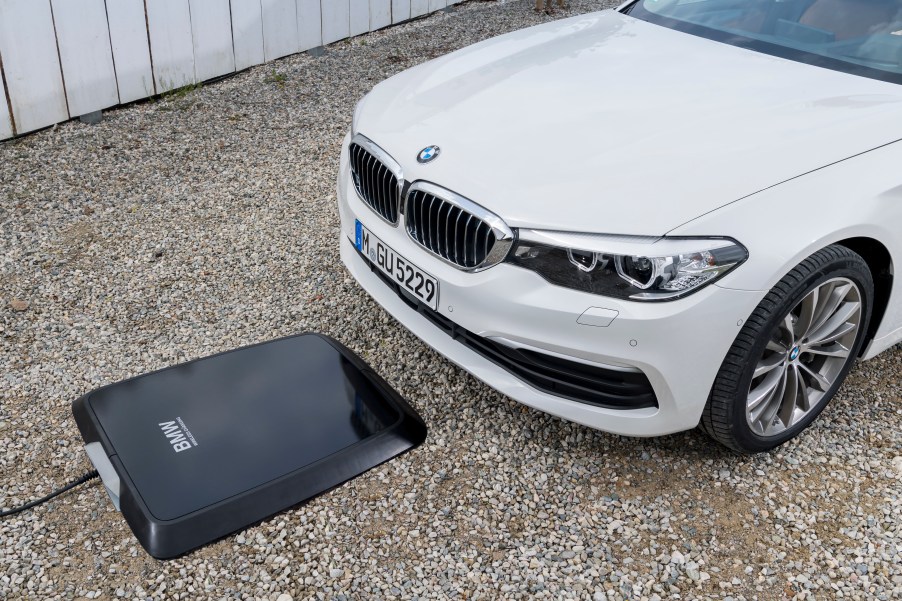
BMW Launches Wireless Charging Pilot Program
BMW is introducing inductive charging through a new pilot program for its 530e iPerformance. Starting in Europe, BMW will then move on to other markets like the U.S. with the car from its EV 5-series. It’s a year later than originally planned, but BMW is finally ready to lead the way with its inductive charging system.
What is inductive charging?
Inductive charging is wireless charging using electromagnetic fields for energy transfer between two objects. The process uses electromagnetic induction; electricity production across a magnetic field. Using an inductive pad or charging station, energy courses through inductive coupling as energy to charge the battery.
For the BMW 530e iPerformance, the unit uses a CarPad which attaches to the undercarriage of the vehicle and connects to the lithium-ion battery. No plug or cable required.
It also uses a GroundPad which installs outside or on a garage floor. The car’s display screen acts as a guide for positioning the car properly on the GroundPad.
Matching has to be pretty close. You are only allowed up to three inches of leeway moving forward and backward. You have five inches for error on either side. Once the car is in the correct position, pressing Start begins the wireless charging starts. When it reaches the maximum charge, the system turns itself off.
It takes approximately three and a half hours to recharge the 9.2-kWh battery used by the 530e. With a claimed efficiency rate of 85%, BMW maintains that it’s a lot like the speed of its Level 2 home charger.
All the details
BMW’s inductive charging pilot program will focus only on the 530e, the only BMW plug-in that will offer inductive charging. And it will only be available with leased vehicles.
There are only 200 cars in the program. Only California residents with documentation to prove they live in one of 13 approved participating counties who live in a location that qualifies for charging pad installation qualify for the program. Once approved, customers will then go to one of the 33 dealerships in the program to sign up for a 36-month lease of a 2019 530e iPerformance hybrid plug-in sedan. All costs incurred by the inductive charging pad installation, maintenance, and removal are covered.
Hope for the program
Wireless charging for vehicles is one cutting-edge technology that’s been highly anticipated. But it hasn’t been developing as quickly as many would have hoped. With BMW getting the ball rolling with its new program, it could be a real game-changer for the EV market. Some predict that 50% of new car sales will be EV by 2040. If that prediction is accurate, the demand for wireless charging would be considerable.
That inductive charging hasn’t been fully realized by now is interesting. Particularly when you consider most automakers’ push to develop EV additions for their lineups.
Earlier, Mercedes-Benz stated that they would offer wireless charging with their 2018 S550e models but that hasn’t materialized so far. The EV was to offer Qualcomm Halo Wireless Electric Vehicle Charging technology. Evatran, an aftermarket supplier, crafts units for Chevrolet Volt, i3, Nissan Leaf, and Tesla Model S.
Why haven’t we seen wireless charging before now? It’s been hampered by concerns about interoperability, slow charging times, and it’s expensive. Considering the convenience it would bring to many, and the incentive it would offer those considering making the change from traditional car to EV, the promise it holds is substantial.
BMW and the EV market
BMW has a new CEO as of this month, Oliver Zipse. His predecessor drew much criticism for his slow approach to electric cars. Zipse’s comments suggest that he’s not going to deviate from the path the automaker has been on as it develops EVs.
“BMW hopes the 55-year-old can help the company regain its edge in electric cars,” was noted recently by Reuters.
Recently, the company announced that it would step up its electric car plans with the introduction of 25 EVs by 2025. In July, it revealed a new steering wheel that will feature in the forthcoming iNEXT EV in 2021.
BMW is playing it safe in the EV game in not developing a dedicated platform without knowing exactly what the demand will be. They’re safeguarding their combustion engine car business by using the same platform for their EVs. Even with a new CEO in place, it appears they will stay on the same trajectory with electric cars. Still, BMW fans will enjoy seeing them lead the pack when it comes to EVs with the new program.


